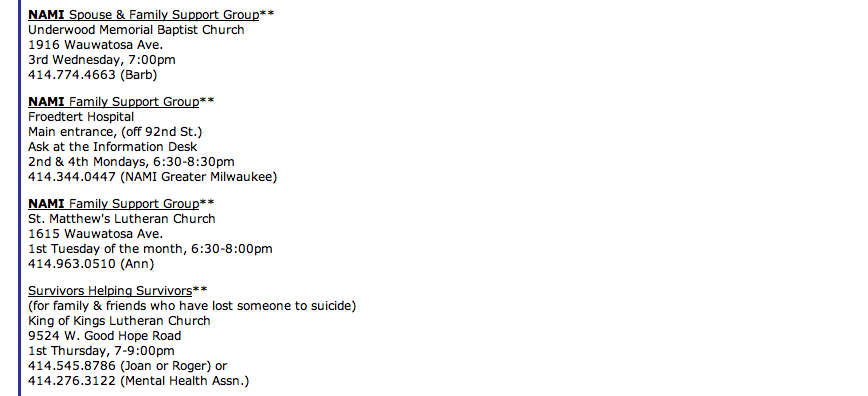Our third and final project for Professor Herbert Lowe's digital journalism class will be focused on mental illness in Milwaukee. With the help of Journal Sentinel reporter Meg Kissinger, my #loweclass colleagues and I will once again work in pairs to create an audio slideshow to accompany a text piece. This time around, however, we'll be reporting on the various aspects of the mental health system in Milwaukee, from psychiatrists to judges to the patients themselves.
For our project, Courtney Perry and I have decided to address the issues that family members face when a loved one is diagnosed with a mental illness. This is obviously something that many people can relate to, including Kissinger herself: she wrote a touching piece about her brother Jake, who struggles with depression. According to Meg, Jake wanted to move out of his group home in Chicago and live with his sister; Meg wondered how such a move might affect not only Jake's life, but Meg's and her husband's lives as well.
Meg's story makes it clear that mental illness doesn't just affect the individuals who live with it; mental illness touches the lives of entire families: parents, siblings, children, aunts, uncles and grandparents. Mental Health America (MHA) of Wisconsin and National Alliance on Mental Illness (NAMI) Greater Milwaukee both offer services to families in Milwaukee that are dealing with mental illness.
NAMI's Family-to-Family Education Program is a free 12-week course for "family members, partners and friends" of individuals with mental illness, including depression, schizophrenia, bipolar disorder and personality disorders. The course is taught by volunteers whose loved ones have been diagnosed with a mental illness. NAMI Greater Milwaukee also sponsors many different support groups, including a few for family members of individuals with mental illness and those who have lost loved ones to suicide.
On the other side of things, MHA of Wisconsin's Strong Families Healthy Homes Program offers a variety of services to support families when parents or caregivers are living with mental illness. The program focuses on aiding parents/caregivers in caring for their family and supporting family members in dealing with a caregiver's mental illness. One of the programs, Intensive In-Home Services, offers classes, therapy, psychiatric services, childcare, parenting assistance and transportation.
It seems there is no shortage of support systems for families who are learning to deal with a loved one's mental illness. However, families have very little control when it comes to that loved one's care within a mental health hospital. The Milwaukee County Mental Health Complex has faced serious accusations of negligence in the past year. In October, Brandon Johnson died at the Mental Health Complex after nurses ignored his complaints of a broken neck. Johnson's death was the fifth this year at the mental health facility; his family demanded an investigation.
Preventable tragedies like Johnson's death must make family members feel so helpless when a loved one is staying at a mental health facility. It's clear that the mental health system in Milwaukee could use some reforms, and I think whoever Courtney and I interview in the coming weeks will have plenty to say on the matter.
For our project, Courtney Perry and I have decided to address the issues that family members face when a loved one is diagnosed with a mental illness. This is obviously something that many people can relate to, including Kissinger herself: she wrote a touching piece about her brother Jake, who struggles with depression. According to Meg, Jake wanted to move out of his group home in Chicago and live with his sister; Meg wondered how such a move might affect not only Jake's life, but Meg's and her husband's lives as well.
Meg's story makes it clear that mental illness doesn't just affect the individuals who live with it; mental illness touches the lives of entire families: parents, siblings, children, aunts, uncles and grandparents. Mental Health America (MHA) of Wisconsin and National Alliance on Mental Illness (NAMI) Greater Milwaukee both offer services to families in Milwaukee that are dealing with mental illness.
NAMI's Family-to-Family Education Program is a free 12-week course for "family members, partners and friends" of individuals with mental illness, including depression, schizophrenia, bipolar disorder and personality disorders. The course is taught by volunteers whose loved ones have been diagnosed with a mental illness. NAMI Greater Milwaukee also sponsors many different support groups, including a few for family members of individuals with mental illness and those who have lost loved ones to suicide.
On the other side of things, MHA of Wisconsin's Strong Families Healthy Homes Program offers a variety of services to support families when parents or caregivers are living with mental illness. The program focuses on aiding parents/caregivers in caring for their family and supporting family members in dealing with a caregiver's mental illness. One of the programs, Intensive In-Home Services, offers classes, therapy, psychiatric services, childcare, parenting assistance and transportation.
It seems there is no shortage of support systems for families who are learning to deal with a loved one's mental illness. However, families have very little control when it comes to that loved one's care within a mental health hospital. The Milwaukee County Mental Health Complex has faced serious accusations of negligence in the past year. In October, Brandon Johnson died at the Mental Health Complex after nurses ignored his complaints of a broken neck. Johnson's death was the fifth this year at the mental health facility; his family demanded an investigation.
Preventable tragedies like Johnson's death must make family members feel so helpless when a loved one is staying at a mental health facility. It's clear that the mental health system in Milwaukee could use some reforms, and I think whoever Courtney and I interview in the coming weeks will have plenty to say on the matter.

 RSS Feed
RSS Feed